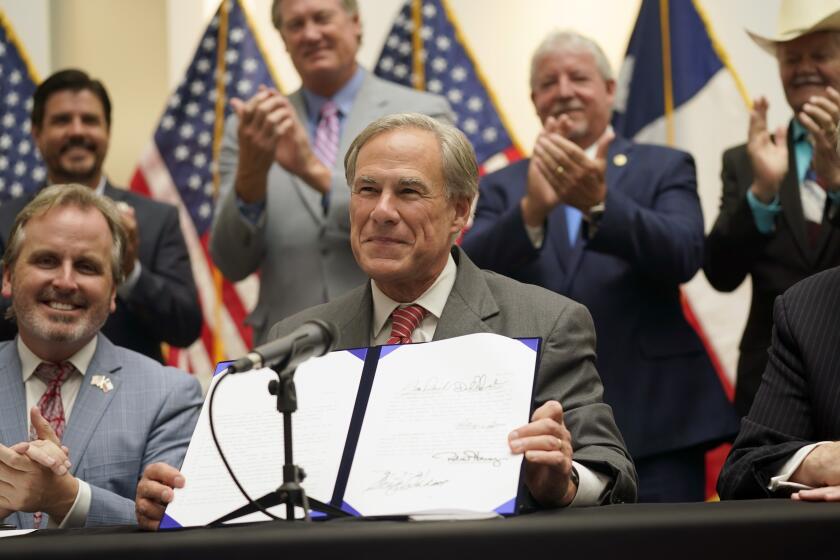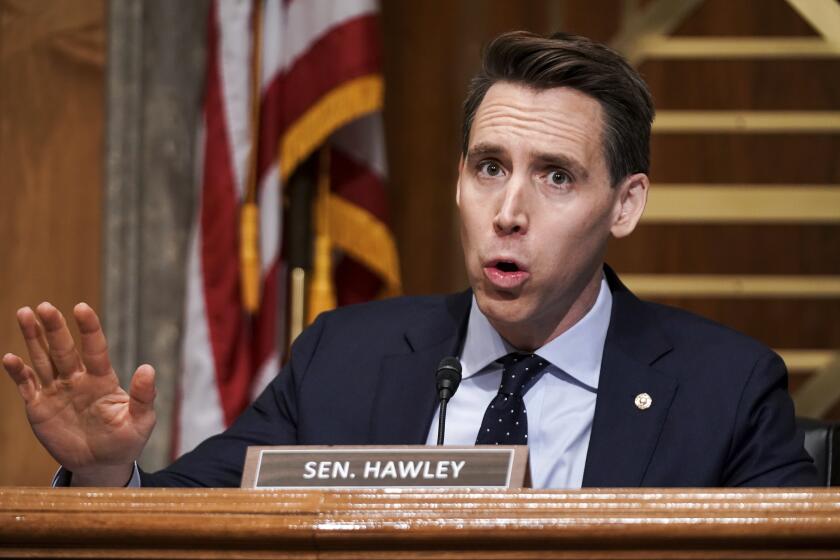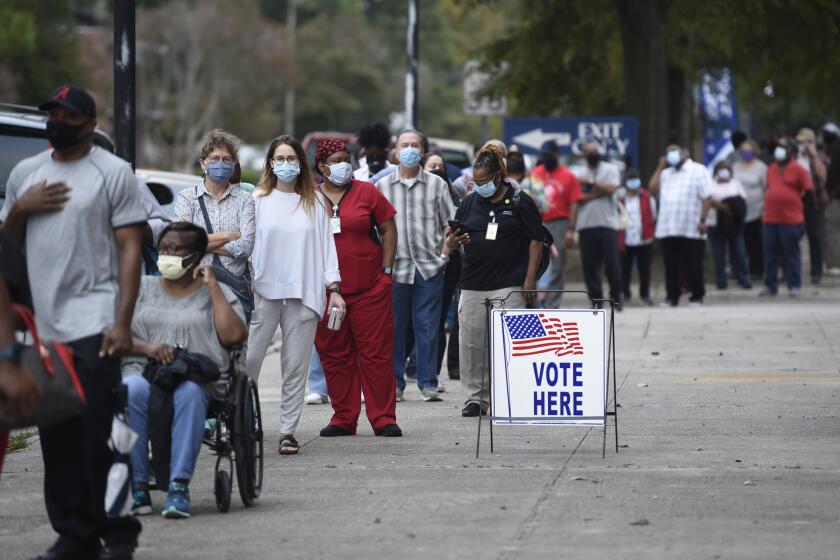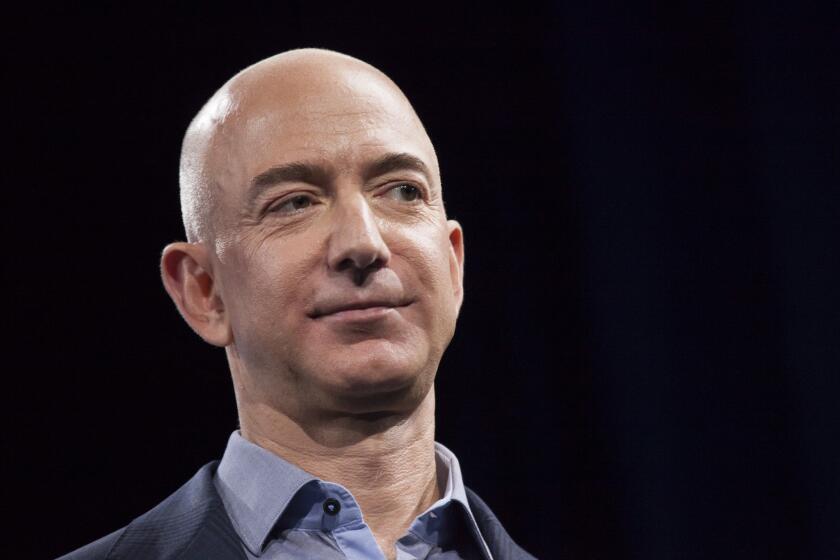Column: How Big Business lied about opposing rightwing attacks on democracy, abortion rights and voting rights
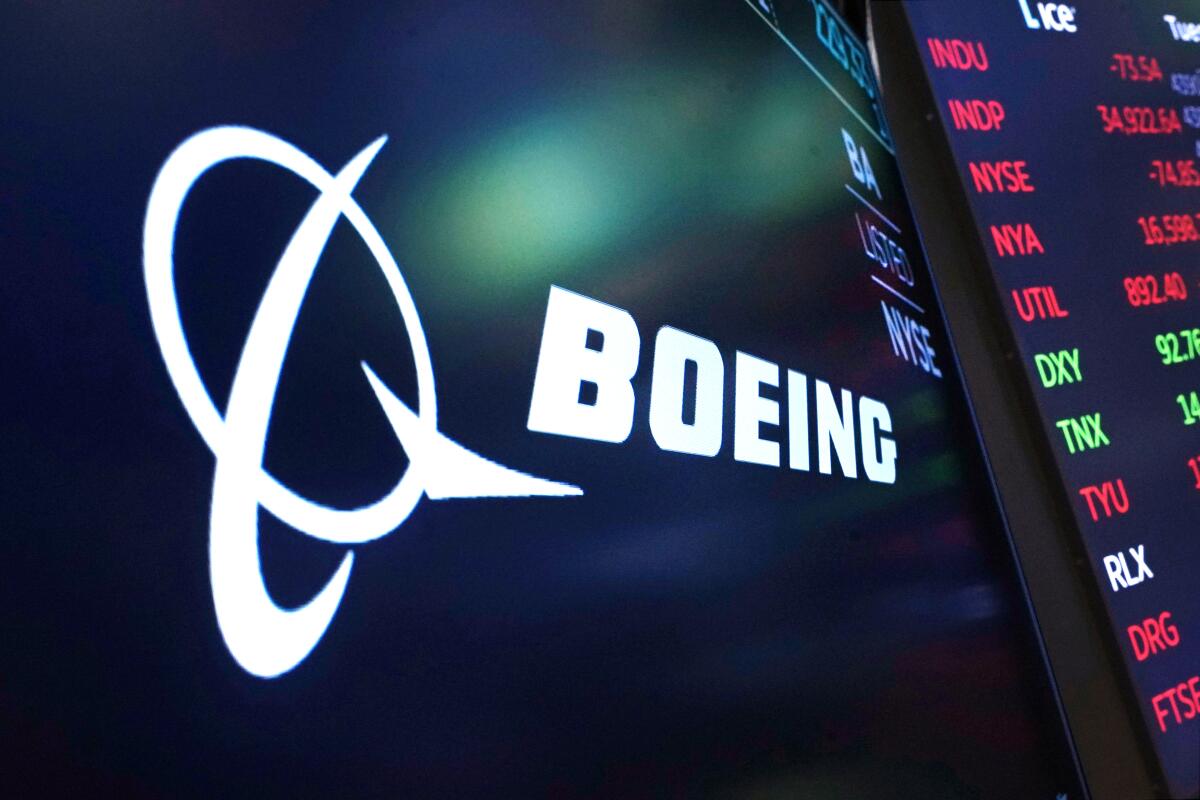
- Share via
Over the last year or two, many of the nation’s corporate leaders pledged to stand firm against the assaults from the political right wing on voting rights, women’s access to reproductive healthcare and democracy itself.
Leading corporations said they would cease making campaign contributions to lawmakers who voted against certifying Joe Biden’s election or played a role in the Jan. 6, 2021, insurrection in Washington.
Some made similar promises about state laws restricting abortion or voting rights, or talked openly about reducing their activities in states enacting such measures.
Toyota supports candidates based on their position on issues that are important to the auto industry and the company.
— Toyota tells the truth about why it contributes to politicians
Sorry to be the bearer of bad news, but corporate America has turned out to be an exceedingly thin reed to lean on.
Many companies that once expressed a commitment to end or at least review their contributions to the 147 Republicans who voted against certifying the election have gone ahead and contributed to those lawmakers in subsequent months.
Get the latest from Michael Hiltzik
Commentary on economics and more from a Pulitzer Prize winner.
You may occasionally receive promotional content from the Los Angeles Times.
Corporations by the score, even the hundreds, have been happy to sign on to rhetorical displays of good citizenship. They place newspaper ads and social media postings attesting to their devotion to principles such as the right to nondiscriminatory reproductive healthcare, or their commitments to serve their employees, vendors and communities, not just their shareholders, as in the “statement on the purpose of a corporation” issued in 2019 by the Business Roundtable. It’s the rare public corporation that doesn’t boast a commitment to the loftiest of human values on the “corporate responsibility” pages of their websites.
Corporate America has been almost silent on a Texas law that bans most abortions and promotes vigilantism. That’s no surprise when its own interests are at stake.
Typically, these commitments are exercises in platitudinousness. Chevron, for example, says, “We define energy in human terms,” whatever that means. (In practice, Chevron has shunned any move toward renewable energy sources, except for “renewable natural gas,” which is a sham.)
Much of corporate America has been missing in action when it comes to supporting abortion rights and voting rights with more than talk, as those rights get pared away by state legislators.
Major companies headquartered in Texas have been heavy contributors to sponsors of the state’s horrifying SB 8.
That law not only bans all abortions after roughly six weeks — before most people even know they’re pregnant, according to Planned Parenthood — but allows no exceptions even in cases of rape or incest and contains a “bounty” provision allowing anyone, even strangers outside the state, to sue doctors or anyone suspected of aiding and abetting an illegal abortion for up to $10,000 per defendant.
According to Judd Legum’s indispensable Popular Information website, Dallas-based AT&T contributed more than $300,000 to sponsors of SB 8 since 2018.
Out-of-state companies that contributed five- or six-figure sums to those politicians include CVS and the cable companies Comcast and Charter Communications. As we’ve reported before, many large Texas-based companies have remained silent on the law, including American Airlines, Texas Instruments, Dell Technologies and Hewlett Packard Enterprise.
Assaults on voting rights attract somewhat more explicit responses, but not by much. Georgia-based Coca-Cola and Delta Air Lines both spoke out against that state’s voting suppression law after it was signed by Republican Gov. Brian Kemp (on March 25, in a secret ceremony), calling it “unacceptable.”
Toyota has contributed more than any other company to lawmakers who voted against certifying the 2020 election.
But neither spoke out while the measure was making its way through the Legislature, in full view. Both had supported the sponsors of that bill and other voter-suppression measures with campaign contributions for years.
These cases are especially important because some of the most determined attacks on voting, reproductive healthcare and other important rights are unfolding at the state level. Consider the 10,055-page IRS filing made Jan. 31 by the Republican State Leadership Committee, which funds state-level initiatives such as abortion restrictions and voter suppression. (Credit to Legum for unearthing the document.)
Covering only the second half of last year, the filing identifies dozens of major corporations as its financial backers, including Google ($155,000), Anthem ($205,000), Wells Fargo ($50,000), Comcast ($135,000), Chevron ($315,000) and AT&T ($150,000). I asked those companies for comment on how those donations comported with their stated commitments to voting and healthcare rights.
As of this writing, Wells Fargo replied that it “supports organizations from both political parties who are committed to addressing the critically important issues our company, employees, customers, and country are facing.” JPMorgan said, “We are going to decline to comment on this.” The others didn’t reply.
Let’s not mince words about why corporations are reluctant to put their money where their mouths are — and indeed are willing to support politicians with cash while condemning their votes in public.
Toyota — which was identified in June by the watchdog group Citizens for Responsibility and Ethics in Washington as the largest contributor up to that point to the 147 anti-certification lawmakers, with $55,000 in donations — offered the most explicit description of the process.
Don’t believe corporations when they say they’re reconsidering their political donations.
“Toyota supports candidates based on their position on issues that are important to the auto industry and the company,” the company told me by email at the time. “We do not believe it is appropriate to judge members of Congress solely based on their votes on the electoral certification.”
In a rational world, this would be taken as a concise description of graft, which is illegal. We don’t live in that world, however, but in one where using campaign contributions to pay off politicians who carry your water is perfectly legal, so it can’t be labeled as such.
That’s further evidence that the virus infecting the American political process is money, specifically corporate money. The carrier of the sickness is the Supreme Court’s 2010 Citizens United decision, which opened the floodgates to corporate spending on political campaigns.
Big business has always had an outsized influence in politics, but it has only gotten much worse in the last decade. It should be obvious that corporations shouldn’t be permitted to make any campaign contributions because their dollars will always overwhelm contributions from individuals while their interests will more often than not conflict with the public interest.
Of course, there will always be spokespersons for the notion that big business has the public at heart. The canonical defense came in a recent essay by Jeffrey A. Sonnenfeld of the Yale School of Management, who hangs with denizens of corporate C-suites as founder and president of the nonprofit Chief Executive Leadership Institute.
Georgia’s voting law is even worse than you’ve heard, and Delta and Coke aren’t heroes about it.
In a column originally published in the magazine Chief Executive, Sonnenfeld assured his readers that, when it comes to the fate of democracy in the wake of the Jan. 6 insurrection, “concern among big business remains very much alive.”
Referring to pledges by major corporations to suspend their political donations in the wake of the Jan. 6 attack, Sonnenfeld writes that “even though the moratorium on corporate political donations was only temporary ... consistent compliance has ranged between 80% and 95%.” (His figures are based on Federal Election Commission reports for the first three quarters of 2021.)
“While a handful of companies, including Boeing, did renege,” Sonnenfeld asserts, “the remarkable consistency — rather than those exceptions — should be the headline.”
This would be like airlines complaining that news articles about air crashes never mention that the vast majority of flights end safely.
To be fair to Sonnenfeld, it’s true that many companies have kept to their promises. The Jan. 6 Corporate Accountability Index maintained by Legum lists 72 corporations that have kept to their pledges either to suspend all political donations or those to the lawmakers who voted against certifying the results — but 94 that violated the letter or spirit of their pledges, directly or indirectly.
Indeed, by Sonnenfeld’s own estimate, as many as 1 in 5 U.S. corporations lied about their commitment to democratic ideals. That’s the story.
Take Boeing. The giant aircraft manufacturer ranked 54th on the Fortune 500 in 2021 (down from 40th in 2020), with more than $58 billion in sales and 141,000 employees. If America’s emblematic heavy manufacturer is reneging on its promises, that’s not a case to be hand-waved away.
Column: Last year CEOs pledged to serve stakeholders, not shareholders. You were right not to buy it
In the year since the CEOs promised to serve more than just shareholders, there have been few if any no signs that major corporations have taken real any steps they wouldn’t have taken without outside pressure, whether from public opinion or government regulation.
More than two dozen other prominent companies reneged on commitments to withhold contributions to the 147 lawmakers, all Republicans, who voted against certifying the election results on Jan. 6.
Twenty companies were cited by the watchdog group Accountable.us from federal campaign reports. They include the tobacco company Altria ($84,000 in 2021 contributions to those lawmakers), Chevron ($62,500), health insurer Cigna ($30,000), ExxonMobil ($61,000), General Motors ($92,500) and Lockheed Martin ($184,500).
All 20 of the companies cited by Accountable.us had either specifically condemned the activities of Jan. 6 or committed to suspending, reviewing or ending their political contributions. But not a few gave themselves an escape route, by specifying that they were suspending contributions “at this time,” as Boeing put it.
The Wall Street Journal counted eight more companies not appearing on the Accountable.us list, including American Airlines, Goldman Sachs and Comcast.
Boeing was the largest contributor to what Accountable.us rightly terms the “sedition caucus,” with $190,000 in contributions. Boeing, in other words, is the tip of a very large iceberg.
Finally, Sonnenfeld argues that financial contributions shouldn’t be the only metric by which corporations should be judged: “Many companies are finding themselves compelled to move beyond campaign contributions to weigh in on political and social issues directly.” He quoted Michael Dell of Dell Technologies stating, “If corporations cannot speak out on voting access and ballot security, what can they address?”
Two difficulties here. One is that talk is cheap. If it’s not backed up by companies putting their money where their mouths are, it’s worth less than zero—after all, it’s easy to mouth generalized testaments to the virtues of democracy; but a lot different to withhold cash from individual politicians in a position to grant you favors. The second is that many major companies aren’t speaking out or have backed away from their earlier commitments.
The lesson is also clear. Americans can’t rely on corporate leaders to protect their interests while political leaders are so hell-bent to undermine them.
The business community will always strive to place its collective thumb on the scale to protect its own interests, even when the very fabric of social cohesion is fraying. The sooner Americans recognize that reality, the sooner they may feel compelled to demand, and perhaps achieve, change.
More to Read
Get the latest from Michael Hiltzik
Commentary on economics and more from a Pulitzer Prize winner.
You may occasionally receive promotional content from the Los Angeles Times.

